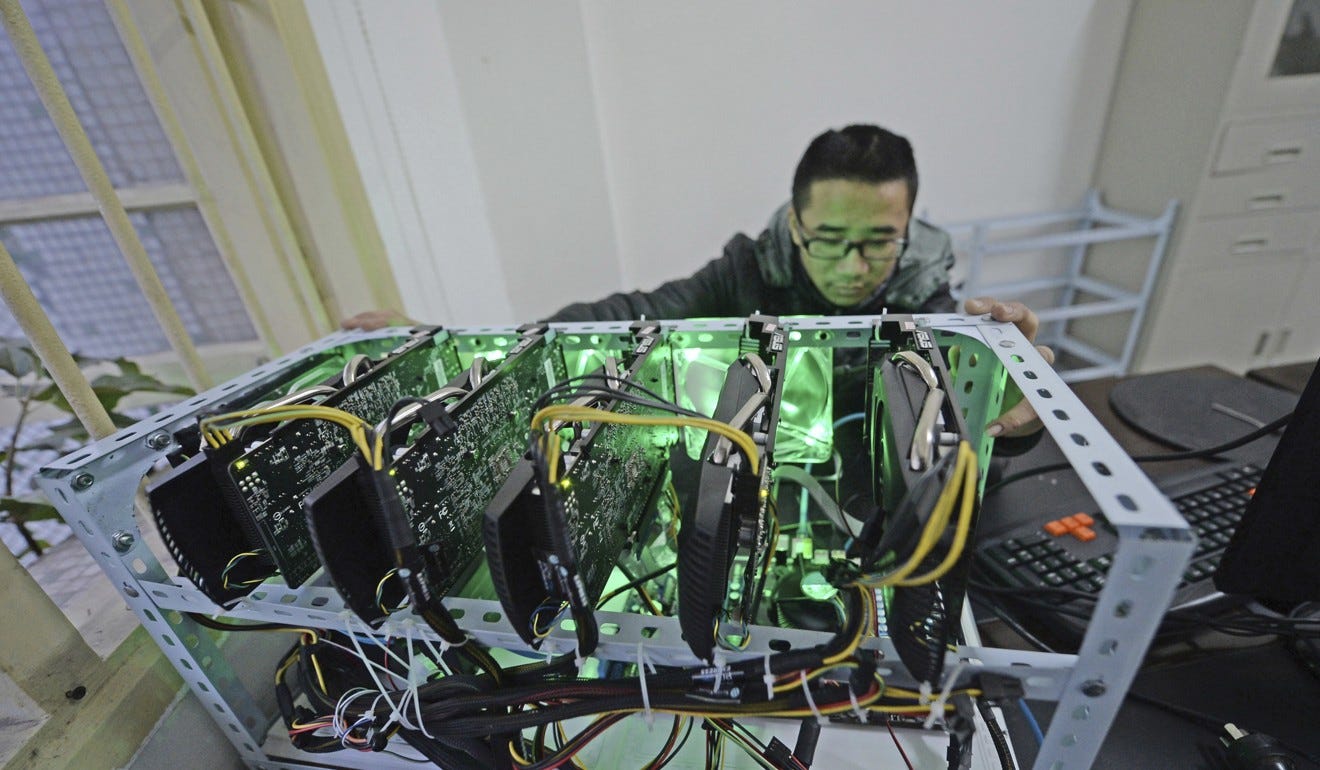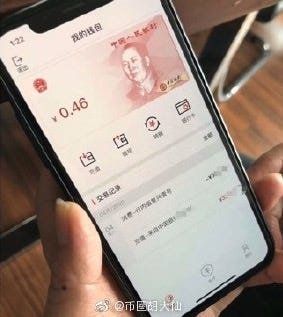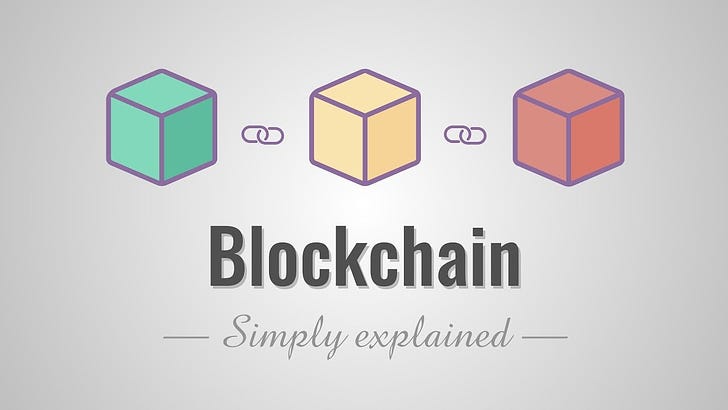Blockchain + China 101
Blockchain in China: what it is now and what is going to be in the future.
大家好 Hello everyone.
The Year of the Ox is upon us and with it crazy images of gold painted bulls in 3D screens.
In the past few months crypto currencies have been all the rage again. With Bitcoin and Ethereum reaching all time high valuations. This is culminating in memes from Elon Musk about DogeCoin or a website where you can see how much of a fortune you could have won if you had just bought some bitcoin instead of an Apple Watch, for example.
China has had an interesting relation with the crypto world, but even more so, a strong interest in its underlying blockchain structure. And this is this weeks topic.
Index
What is blockchain.
Blockchain in China until now.
Main players and some associated projects.
Is the Digital Yuan blockchain?
Conclusion + Blockchain in the near future.
What is blockchain (please bear with me):
Blockchain is talked about a lot due to the fact that it can provide information in an instantaneous, transparent and efficient way. This technology can be used to track anything from currency exchange transactions to package deliveries or even livestock.
So imagine I have a public Google docs file with a bunch of text written there.
You, I, and anyone else that access this document are "nodes”.
Each paragraph in the document is a "block”.
Each paragraph has its text, or “data”.
It also has some sentences that make it unique like knowing its about puppies (hash).
Finally each paragraph (block) has a couple of sentences (hash) from the previous paragraph. Kinda like a link between these 2 blocks.
Each time someone makes a change to the paragraph, the structure of it changes. So the "hash” changes which makes it a different “block” all in all.
So let’s say you have 3 paragraphs that you wrote and you are super happy about their structure. You really like to write about puppies. Now “Jorge” decides that he prefers kittens and changes the topic in your second paragraph. Oh no!
This means that the information on your third paragraph about the previous one that was just modified by evil Jorge is not correct now. Which completely invalidates all the paragraphs after, rings the alarm and something called proof of work kicks in. This makes everything slower and makes it harder for Jorge to change other paragraphs (which we don't want).
Also, because your puppies paragraph was tampered and the continuation of paragraph or "chain of blocks” was broken, every version of this Google doc that people are accessing (the nodes) is invalid now as well, with a clear view on what broke everything.
This is blockchain in a really simple way and what makes it almost impossible to tamper with successfully. As you can see, it is also efficient and transparent.
If you are still confused about blockchain technology I recommend this Youtube video.
Blockchain in China until now
China’s “official” exploration of blockchain started in 2014 when the People’s Bank of China formed a study group to research on the topic and how to issue digital currencies.
In 2016 banks started working on how to use this technology to aid them with operational features such as transactional speed and compliance methods for credit systems.
China banned crypto Initial Coin Offerings - meaning the launch of new cryptocurrencies - in 2017 and cracked on exchanges after stating that these processes were unauthorized fundraising, which is a criminal offence in the country.
The popularity of cryptocurrencies at the time and the inherent speculation of this type of assets was too much for the central government which had also grown weary of other options such as peer-to-peer lending and pyramid sales by that time.
Back in 2017 though, there was already a view that blockchain could be a great tool for the development of digital currencies through its risk mitigation possibilities and transactional records.
In October 2018 a blockchain pilot zone was established in Wenchang, Hainan, a city in the island province just off Southern mainland China. This was made in order to establish a cluster of blockchain related companies, and a preceding move to building the status of Hainan as a Free Trade Port by 2035.
There was another crackdown in 2019 though. Showcasing that the government still wants to remain in control and clearly differentiates the capabilities of blockchain from the cryptocurrencies, which are only one way of using this type of technology.
On October 2019, President Xi Jinping acknowledged blockchain as a core technology and the Blockchain Service Network was born. What is it, you ask? The BSN is a cross-cloud, cross-portal, and cross-framework (wowza so many “crosses”) global infrastructure network used to deploy and operate all types of blockchain applications. Basically, it allows that different blockchain platforms, such as your run of the mill Ethereum and EOS crypto currencies, can work together and understand each other. Kinda like a translator of sorts in the end.
And, in December of the same year the Shenzhen’s Stock Exchange, the financial institution from the megapolis that borders Hong Kong SAR, launched the “Blockchain 50 Index” which reflects the performance of key companies that are connected in the research and utilization of this type of technology.
In April 2020 China’s central government created a National Blockchain Technical Commitee with big players such as the People’s Bank of China, Tsinghua University, Fudan University, JD Digital, Tencent, Baidu, etc. This is seen as a platform for accelerating the implementation of the Digital Yuan in China’s economic system. One of these examples is that JD became the first e-commerce platform accepting payments for certain products in Digital Yuan.

Main players and some associated projects.
Tencent - cloud infrastructure and one of the main backers of the Blockchain Service Network. Cross-border movement solutions.
Ant Group - Platform to help small and medium enterprises with cross-border trade.
Baidu - Xuperchain Blockchain platform to simplify the launch of decentralized applications
Xunlei - High-performance blockchain infrastructure and cloud storage services.
Hyperchain - Blockchain for Internet of Things. Working with China’s State Grid by creating an energy asset management platform.
Ping An Bank - OneConnect financial company.
Midea Group - supply chain management and finance.
Is the Digital Yuan project based on blockchain?

Well yes, but mostly no.
The DCEP - Digital Currency Electronic Payment - is a blockchain inspired project but not a typical cryptocurrency, it is a centralized digital currency.
I still felt that it was important to include a brief explanation of what it is since a lot of people confuse it with decentralized currencies such as Bitcoin. DCEP's goal is not to substitute the current legal tender. It borrows some features such as blockchain’s traceability and “smart contracts”.
See it more as an extension of the Chinese Yuan. An innovative way to being able to process transactions in a more secure fashion and being able to do it offline even with your phone through NFC tech.
Through better fraud protection technology, the control of monetary circulation and outflow of funds, the PBOC envisions a strong Yuan in comparison to currencies like USD or EUR. The digitalization of the currency would help underbanked communities as well.
Undoubtedly it’s also a way for the PBOC to bring in the reigns on private digital wallets like Alipay or Wechat Pay. The central gov is looking to regulate these private players that control 55.4% and 38.5% of China's mobile payments.
Any merchants that currently accept digital payments like the ones mentioned above will HAVE to accept payments through DCEP, or risk losing their business licenses. It would be the same thing as not accepting a pink crisp physical 100CNY bill.
Tests are being made in cities like Shenzhen, Suzhou, Shanghai, Beijing , etc. through "digital red envelopes" that are sent to people in a lottery style system. Some companies like JD, Didi or Meituan accept DCEP already.
Now could it set a precedent for other countries? Well sure it’s a possibility, especially through the Belt and Road Initiative (BRI), of course. It is of China’s interest that cross-border transactions and contracts regarding the project are made as much as possible in CNY for example.
Countries in key regions for the BRI innitiative like Central Asia and East + Subsaharan African could therefore be more keen to accept transacting externally in DCEP instead of their own more volatile currencies or USD since most their deals are made with China anyway.
Conclusion + Blockchain in the near future
But before that here is how Techcrunch differentiates some types of blockchain:
There are two main types of blockchains: permissionless, which is public, decentralized and transparent; and permissioned, which is operated by one or multiple stakeholders of a given industry, respectively called private and consortium blockchains.
China will continue its emphasis in researching possibilities for blockchain implementations and setting standards for it. Its focus though will be more and more on the permissioned type of blockchain, by the different levels of government - be it on a national scale or on a local municipality - and private companies, in order to make whole processes more efficient and transparent, such as public transportation, energy grids and logistics, whilst at the same time maintaining a certain type of information control.
By using blockchain, health agencies will be able to assist each other in maintaining health records that can be used for cross-border crossings i.e someone from Guangzhou entering Macau SAR as per SCMP. Covid-19 status tracking “passports” will be a worldwide phenomenon - although China already offers several QR code based solutions - and hopefully enable the opening of certain countries and the start of the resurgence of the tourism industry (of which China is one of the major players).
Blockchain will continue to be of great importance in assuring food safety standards as well, through its tracking capabilities - meaning getting a detailed report of the livestock’s life cycle, health and even steps taken in its life - to the growing middle class that is still mindful of past food scandals and doesn’t mind paying an extra fee to protect their and their families’ health.
There are endless possibilities that can be associated with blockchain to be honest. In terms of foreseeable blockers though, we can see a backstop from investments by the government if a lot of “decentralized” and “anti-system” solutions start popping up, as it also happened with digital currencies in previous years. Also this type of technology requires a lot of work for integration in legacy systems. Chinese government still uses Adobe Flash (killed last month due to security issues) for example.
Let’s see how this world evolves in the next couple of years. I will be here following the updates and share more about it with you in the future articles.
Was this article useful?
My name is Jorge and China Abridged is where I write weekly about Chinese technology and society. I have a B.A in Asian Studies with the University of Lisbon, won a scholarship from the Confucius Institute for academic excellency and lived for 2 years in the Middle Kingdom.
For the past 4 years I have been involved with one of the biggest fin-tech startups in the world and now I spend my time honing my language skills, perusing articles about 中国, and perfecting my RSS feed.
You can check out all past issues here . Also I would be extremely thankful if you shared this article with your friends and colleagues in the case you found it interesting.
Any suggestions for topics or feedback? Let me know on Twitter 🐦 @jorgegoncalo.



